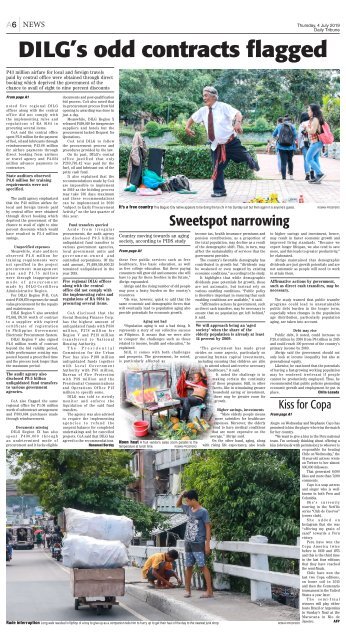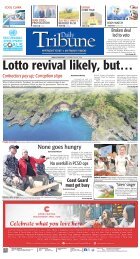04 JULY 2019
Create successful ePaper yourself
Turn your PDF publications into a flip-book with our unique Google optimized e-Paper software.
A6 NEWS<br />
Thursday, 4 July <strong>2019</strong><br />
Daily Tribune<br />
DILG’s odd contracts flagged<br />
P43 million airfare for local and foreign travels<br />
paid by central office were obtained through direct<br />
booking which deprived the government of the<br />
chance to avail of eight to nine percent discounts<br />
From page A1<br />
noted five regional DILG<br />
offices along with the central<br />
office did not comply with<br />
the implementing rules and<br />
regulations of RA 9184 in<br />
procuring several items.<br />
CoA said the central office<br />
spent P2.9 million for the payment<br />
of fuel, oil and lubricants through<br />
reimbursement; P43.08 million<br />
for airfare payments through<br />
direct booking from airlines<br />
or travel agency and P4.024<br />
million advance payments to<br />
contractors.<br />
State auditors observed<br />
P4.6 million for training<br />
requirements were not<br />
specified.<br />
The audit agency emphasized<br />
that the P43 million airfare for<br />
local and foreign travels paid<br />
by central office were obtained<br />
through direct booking which<br />
deprived the government of the<br />
chance to avail of eight to nine<br />
percent discounts which would<br />
have resulted in P3.4 million<br />
savings.<br />
Unspecified expenses<br />
Meanwhile, state auditors<br />
observed P4.6 million for<br />
training requirements were<br />
not specified in the project<br />
procurement management<br />
plan and P1.75 million<br />
were through inappropriate<br />
mode of procurement<br />
made by DILG-Cordillera<br />
Administrative Region.<br />
For DILG Region IV-B, CoA<br />
noted P109,670 expenses for small<br />
value procurement for the repairs<br />
and maintenance.<br />
DILG Region V also awarded<br />
P2,661,176.50 worth of contract<br />
to a supplier with expired<br />
certificate of registration<br />
in Philippine Government<br />
Electronic Procurement System.<br />
DILG Region V also signed<br />
P4.6 million worth of contract<br />
beyond the bid validity period,<br />
while performance scrutiny was<br />
posted beyond a prescribed time<br />
and the process took longer than<br />
the maximum period.<br />
The audit agency also<br />
disclosed P9.5 billion<br />
unliquidated fund transfers<br />
to various government<br />
agencies.<br />
CoA also flagged the same<br />
regional office for P1.06 million<br />
worth of subcontract arrangement<br />
and P303,694 purchases made<br />
through reimbursement.<br />
Documents missing<br />
DILG Region IX has also<br />
spent P400,000 through<br />
an undetermined mode of<br />
procurement and it lacks eligible<br />
documents and post-qualification<br />
bid process. CoA also noted that<br />
its procurement process from bid<br />
opening to awarding was done in<br />
just a day.<br />
Meanwhile, DILG Region X<br />
released P498,810 for inexpensive<br />
suppliers and hotels but the<br />
procurement lacked Request for<br />
Quotations.<br />
CoA told DILG to follow<br />
the procurement process and<br />
procedures provided by the law.<br />
On its part, DILG’s central<br />
office justified that only<br />
P283,793.42 was paid for the<br />
fuel, oil and lubricant out of the<br />
petty cash fund.<br />
It also explained that the<br />
recommendations made by CoA<br />
are impossible to implement<br />
in <strong>2019</strong> as the bidding process<br />
may take 136 days maximum<br />
and these recommendations<br />
can be implemented in 2020<br />
“subject to Early Procurement<br />
Activity” on the last quarter of<br />
this year.<br />
Fund transfers queried<br />
Aside from irregular<br />
procurements, the audit agency<br />
also disclosed P9.5 billion<br />
unliquidated fund transfers to<br />
various government agencies,<br />
local government units and<br />
government-owned and<br />
controlled corporations. Of the<br />
said amount, P1,699,518,600.25<br />
remained unliquidated in the<br />
year 2018.<br />
Five regional DILG offices<br />
along with the central<br />
office did not comply with<br />
the implementing rules and<br />
regulations of RA 9184 in<br />
procuring several items.<br />
CoA disclosed that the<br />
Social Housing Finance Corp.<br />
has the highest amount of<br />
unliquidated funds with P350<br />
million, P278 million for<br />
Region V and P213 million<br />
transferred to National<br />
Housing Authority.<br />
The Presidential<br />
Commission for the Urban<br />
Poor has also P199 million<br />
unliquidated funds together<br />
with Local Government<br />
Authority with P85 million,<br />
Bureau of Fire Protection<br />
with P39 million and the<br />
Presidential Communications<br />
and Operations Office P12<br />
million to specify some.<br />
DILG was told to strictly<br />
monitor and enforce the<br />
liquidation of the said fund<br />
transfers.<br />
The agency was also advised<br />
to require the implementing<br />
agencies to refund the<br />
unspent balance for completed<br />
undertakings and for cancelled<br />
projects. CoA said that DILG has<br />
agreed to the recommendations.<br />
Hananeel Bordey<br />
It’s a free country This Baguio City native appears to be doing the tai chi in his Sunday suit but then again it is anyone’s guess.<br />
Country moving towards an aging<br />
society, according to PIDS study<br />
From page A1<br />
these free public services such as free<br />
healthcare, free basic education, as well<br />
as free college education. But these paying<br />
consumers will grow old and someone else will<br />
have to pay for these freebies in the future,”<br />
Abrigo expounded.<br />
Abrigo said the rising number of old people<br />
may pose a heavy burden on the country’s<br />
resources.<br />
“He was, however, quick to add that the<br />
same economic and demographic forces that<br />
will eventually lead to population aging also<br />
provide potentials for economic growth.<br />
Aging not bad<br />
“Population aging is not a bad thing. It<br />
represents a story of our collective success<br />
as Filipinos. It means that we were able<br />
to conquer the challenges such as those<br />
related to income, health and education,” he<br />
explained.<br />
Still, it comes with both challenges<br />
and prospects. The government, he noted,<br />
is particularly affected as<br />
Noon heat A fruit vendor’s sales zoom parallel to the<br />
temperature at lunch time.<br />
ROMAN PROSPERO<br />
Rude interruption Long walk resulted in flipflop of a boy to give up as a companion tells him to hurry up to get their haul of the day to the nearest junk shop.<br />
Sweetspot narrowing<br />
income tax, health insurance premiums and<br />
pension contributions, as a proportion of<br />
the total population, may decline as a result<br />
of the demographic shift. This, in turn, may<br />
affect the sustainability of services that the<br />
government provides.<br />
The country’s favorable demography has<br />
contributed to growth but “dividends may<br />
be weakened or even negated by existing<br />
economic conditions,” according to the study.<br />
It highlights that while demographic<br />
dividends pose potentials for growth, these<br />
are not automatic, but instead rely on<br />
various enabling conditions. “Public policy<br />
is therefore important in ensuring that such<br />
enabling conditions are available,” it said.<br />
“Affirmative actions by government, such<br />
as direct cash transfers, may be necessary to<br />
ensure that no population get left behind,”<br />
it said.<br />
We will approach being an ‘aged<br />
society’ when the share of the<br />
elderly population is already at least<br />
14 percent by 2069.<br />
“The government has made great<br />
strides on some aspects, particularly on<br />
promoting human capital investments,<br />
including ensuring that children are able<br />
to attend school and receive necessary<br />
healthcare,” it said.<br />
It noted the challenge is in<br />
making certain the continuity<br />
of these programs. Still, in other<br />
facets, like in stimulating greater<br />
household saving or investment,<br />
there may be greater room for<br />
growth.<br />
Higher savings, investments<br />
“More elderly people means<br />
more subsidies for healthcare<br />
expenses. Moreover, the elderly<br />
tend to have medical conditions<br />
that are more expensive on the<br />
average,” Abrigo said.<br />
On the other hand, aging, along<br />
with rising life expectancy, also leads<br />
ROMAN PROSPERO<br />
to higher savings and investment, hence,<br />
may result in faster economic growth and<br />
improved living standards. “Because we<br />
expect longer lifespan, we also tend to save<br />
more, and this leads to greater productivity,”<br />
he elaborated.<br />
Abrigo maintained that demographic<br />
dividends are just growth potentials and are<br />
not automatic as people still need to work<br />
to attain them.<br />
Affirmative actions by government,<br />
such as direct cash transfers, may be<br />
necessary.<br />
The study warned that public transfer<br />
programs could lead to unsustainable<br />
public debt burden in the longer term,<br />
especially when changes in the population<br />
age distribution, particularly population<br />
aging, are taken into account.<br />
Debt may rise<br />
Public debt, it noted, could increase to<br />
P29.4 trillion by 2030 from P6 trillion in 2015<br />
and could reach 100 percent of the country’s<br />
primary income by 2060.<br />
Abrigo said the government should not<br />
only look at income inequality but also at<br />
generational equity.<br />
Likewise, he cautioned that the potentials<br />
of having a fast-growing working population<br />
may be rendered irrelevant if people<br />
cannot be productively employed. Thus, he<br />
recommended that public policies promoting<br />
economic growth and employment be put in<br />
place.<br />
Chito Lozada<br />
Kiss for Copa<br />
From page A1<br />
Alegre on Wednesday and Stephanie Cayo has<br />
promised to kiss the player who wins the match<br />
for her country.<br />
“We want to give a kiss to the Peru national<br />
team. I’m seriously thinking about offering a<br />
kiss (obviously with permission) to whoever is<br />
responsible for beating<br />
Chile on Wednesday,” the<br />
31-year-old actress wrote<br />
on Twitter to her almost<br />
800,000 followers.<br />
That generated 8,000<br />
likes and more than 7,000<br />
comments.<br />
Cayo is a soap actress<br />
and singer who is wellknown<br />
in both Peru and<br />
Colombia.<br />
She’s currently<br />
starring in the Netflix<br />
series “Club de Cuervos”<br />
(crows club).<br />
She added on<br />
Instagram that she was<br />
“offering my grain of<br />
sand” towards a Peru<br />
victory.<br />
Peru have won the<br />
Copa America twice<br />
before in 1939 and 1975<br />
and this is the third time<br />
in the last four editions<br />
that they have reached<br />
the semi-finals.<br />
Chile have won the<br />
last two Copa editions,<br />
on home soil in 2015<br />
and then the Centenario<br />
tournament in the United<br />
States a year later.<br />
The semi-final<br />
winners will play either<br />
hosts Brazil or Argentina<br />
in Sunday’s final at the<br />
Maracana in Rio de<br />
Janeiro. AFP<br />
ROMAN PROSPERO


















